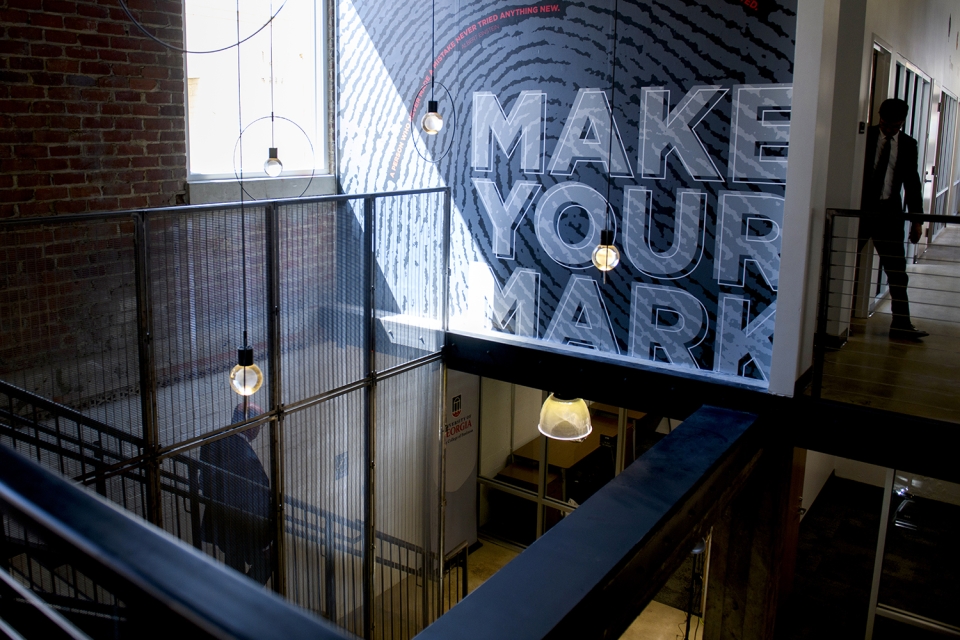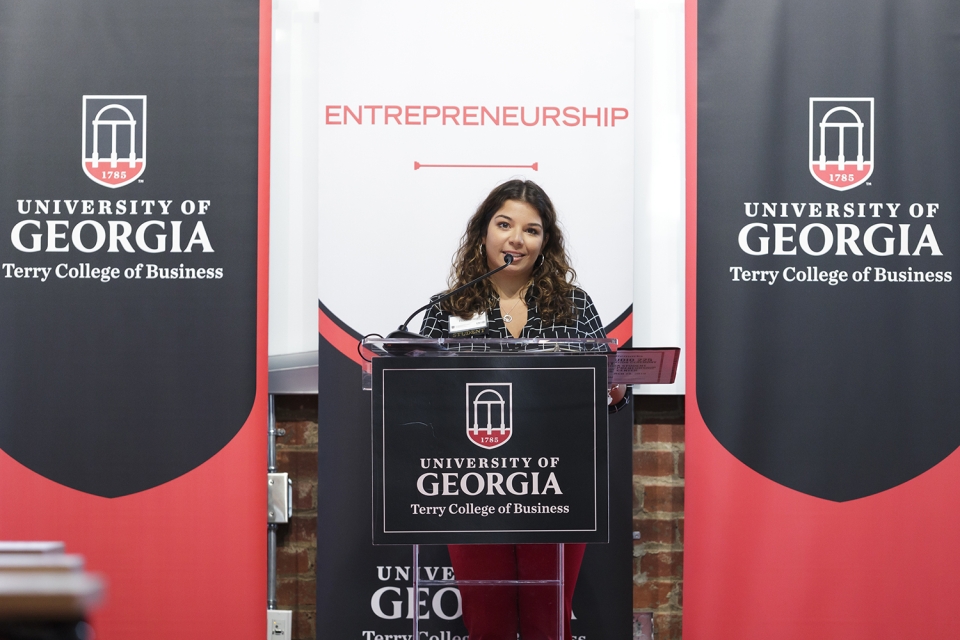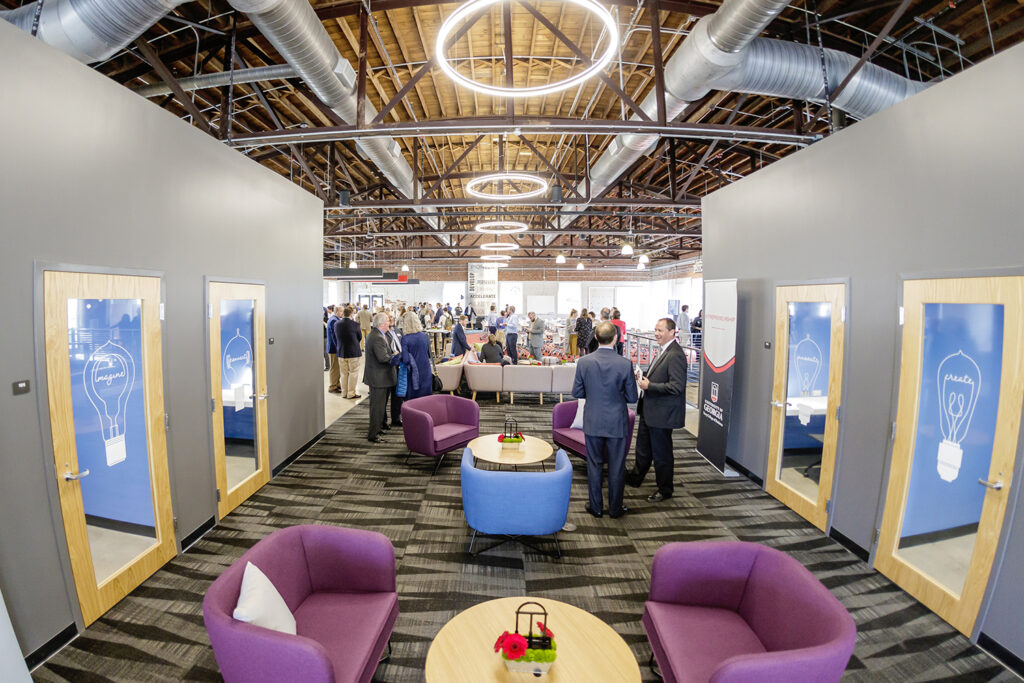Walking into Studio 225 is like entering a startup culture only imaginable on a hip show about Silicon Valley, except this one takes place in downtown Athens.
The two-story, 11,000-square-foot collaborative space imbues a sense of professionalism and community, with areas set aside for team discussions, pitch competitions and incubator meetings. Downstairs, mini boardrooms contain whiteboards for brainstorming sessions, comfortable rolling chairs and mounted TVs for exclusive product demonstrations. In one corner, a makerspace with tables on wheels and square cubby shelving begs for prototype experimentation. Upstairs, a welcoming open space is backed by large LED screens and ringed with easily movable tables and chairs, creating the perfect spot for a rapt audience.
Highlighted by exposed brick, original wood beams and overhead ring lights, the presentation floor leaves no question about what happens here at the SunTrust Foundation Pitch Deck.
“The building itself is beautiful and colorful. It’s a space for everyone,” says Josefina Rodriguez Sturba, a Terry College management information systems and international business major from Acworth. “Ultimately, it’s a centralized location for everything you need.”
Located a stone’s throw from North Campus, the studio is home to UGA’s Student Center for Entrepreneurship. It’s the physical result of years of hard work put into developing the university’s focus on creative thinking and innovation.
“Entrepreneurs created the birthplace of higher education in this country and have continuously contributed to the growth and expansion of this great university,” says Bob Pinckney, UGA’s Greene Director of Entrepreneurship. “This place will serve the needs of student entrepreneurs. Entrepreneurship is alive and well at the University of Georgia, and the best is yet to come.”

It’s also the first step toward the university-wide Innovation District, an initiative to foster collaboration, discovery and multi-disciplinary work around campus, touted to shape the “campus of the future at UGA.” The space is intended to draw industry partners, create internship and research opportunities, and become home to commercialization for on-campus projects.
“This is a vision that would bring our land-grant tradition more fully into the Innovation Age, and I believe the time has come to pursue it,” UGA President Jere Morehead said during his 2019 State of the University address. “You see, our innovation ecosystem is booming. A movement is already underway. This is our moment to accelerate, and we must seize it.”
And UGA has. The Entrepreneurship Program launched three years ago with Pinckney and 33 undergraduates and has grown to more than 1,000 students in several colleges and departments participating in the program’s academic and experiential learning opportunities. What started as a certificate program has now blossomed into a full range of opportunities, including the Entrepreneurship Speaker Series, UGA’s Next Top Entrepreneur competition and the Launch Pad Living Learning Community for freshmen living in Creswell Hall.
But that’s just the beginning of what students can experience when they become part of the Entrepreneurship Program.
“No matter where you are in the entrepreneurial world, you can bounce ideas off others and determine what you need to be doing,” Sturba says. “This community gives you that and can help you grow your ideas and passion.”
Most students interested in entrepreneurship get their first taste of startup life when they join the eight-week UGA Idea Accelerator, a crash-course in developing ideas, interviewing ideal customers and creating pitch decks that might appeal to investors and invested stakeholders. Held during the fall and spring semesters, this is where students learn to “fail fast,” understand marketplace needs and create the minimum viable product required to launch a company.
“I thought everyone was more prepared than I was, but I’ve learned that it’s not about the perfect idea or being perfectly prepared but failing over and over and growing from those experiences,” says Kaitlin Lutz, a marketing major from Smyrna. She decided to join the accelerator on her own rather than as part of a team, which was intimidating and sometimes overwhelming.
At first, she pursued an idea to improve microloans for low-income women, but when she began interviewing potential stakeholders and asking questions, she ran into roadblocks. Although she found it difficult to let go of the idea, her Terry College mentors helped her to realize when it was time to chase a new endeavor. With fewer than three weeks to go, she found a new problem to solve. While talking to her mom on the phone, Lutz heard that her family’s company was struggling to hire qualified workers in the construction industry. With a bit of research, Lutz found women make up less than 2 percent of skilled construction workers. An idea was born.
Racing toward pitch day, Lutz created Sparke Women, a program pairing women with companies that will sponsor their trade school education and hire them after training. On presentation day, she rehearsed her pitch for roommates, friends and anyone at the Zell B. Miller Learning Center who would listen. It paid off, and she won the competition, accompanied by a $5,000 seed grant to get started.

“Now it’s what I think about when I wake up and when I go to bed,” she says. “It’s scary to jump into the unknown, but it’s unbelievably exciting and exactly where I’m supposed to be.”
Since the competition in November, Lutz conducted more than 150 stakeholder interviews with construction company owners, managers, engineers and welders to better understand the industry. She also attended the Women Build America conference in March, where she met leaders in the Women Construction Owners and Executives organization. Now she’s growing her idea through UGA’s Summer Launch program.
“It’s hard to be a student who wants to start a business because not a lot of other people want to do that,” she says. “Here, we’re learning a set of skills and a way of thinking that will set us up for jobs that might exist in a few years from now.”
Once students such as Lutz validate their ideas through the accelerator program, some move onto the Summer Launch, another eight-week session that culminates in a pitch competition and top prize of $5,000. The intensive program pairs teams with business mentors and focuses on moving the students’ businesses toward generating revenue.
“The mentorship and community are so helpful because those who have ‘been there’ as founders can push you and guide you from making mistakes,” says Tommy Naranjo, a management information systems major from Marietta.
He joined the Summer Launch Program in 2018 after winning the Idea Accelerator for Puppyfax, an online platform for dog breeders.
Initially imagined as a platform for customers to search for dogs, Puppyfax has evolved into an all-in-one solution for breeders to manage their businesses. Balancing customer calls with his class schedule for the past year, Naranjo worked with a website developer to build out and launch an integrated kennel management system so breeders can move their business to the digital realm and ditch paperwork.
The site allows them to receive applications from customers, complete digital contracts and store medical test results. With a dozen paying customers, he’s adjusting the site based on their feedback. Now post-graduation, Naranjo plans to throw himself into sales and customer relationships to take the business to a viable level.
“Professors such as Bob Pinckney tell you what you need to hear, not what you want to hear, which is so helpful,” he says. “They’ve been here for me during the whole process, and during my four years here, I’ve seen so much growth in the program.”
Almost like a startup itself, the Entrepreneurship Program iterates each semester, adding on hackathons, internship programs in Silicon Valley and additional funding opportunities such as the UGA Kickstart Fund, a student-managed initiative that provides seed capital grants to students and faculty.
“When I heard about the certificate and this untraditional path of entrepreneurism becoming popular, I knew I needed to get involved. My world exploded as I learned more, and it really changed my trajectory,” says Sturba.
Sturba, also president of the Society of Entrepreneurs, knew she wanted to be a business owner from a young age because she helped her family run several businesses after they moved to the U.S. from Argentina in 2001. When she joined the certificate program, however, her expectations moved to a whole new level.
“In this Age of Information where young people are hijacking the traditional career ladder, entrepreneurism is a good outlet for this generation that is passion-driven and purpose-driven,” she says. “Plus, entrepreneurship is interdisciplinary, and we have thinkers and inventors in every field.”
Sturba is taking her entrepreneurial dreams with her as she begins working for software company Docebo in Athens this summer. She plans to gain industry experience with learning management systems and talk with enterprise clients about the ways they use tools to advance customer needs and their bottom lines. In the next 10 years, though, you better believe she’ll be starting her own business.
“I tell people that I’ll be honored as a Bulldog 100 fastest-growing company,” she says. “UGA’s Entrepreneurship Program brings together people who want to do it, people who are doing it, and people who have done it — all in one space.”

